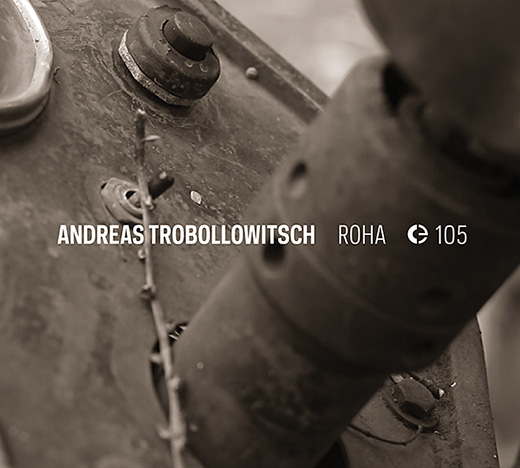“…the real-world sounds are transformed into elements that make up some part of a musical experience, and this is a kind of appropriation of their identities… Even in a piece in which the source sounds are so heavily processed as to be unrecognizable… the fact remains that specific sounds are being used, and by extension, the specific and unrepeatable moment in time when those sounds were produced and recorded. When viewed in this light, it seems clear that the use of concrète materials in a composition dramatically diminishes the comfortable separation between life and art.†– Rose White on musique concrete
Andreas Trobollowitsch is a composer and multi-instrumentalist who makes music from improvised and edited found sounds in an accomplished balance of musical and conceptual narrative. Roha’s peculiar mise-en-scène is perfectly realized, like its cover art, as an aestheticized and reconstructed ideal of creaking industry and discarded instrument, which actively eschews the roughage of its samples to produce highly musical musique concrète.
Andreas’s pieces make no attempt to conceal the industrial and rusted-over origin of their sounds. Instead, through careful editing and composition, Trobollowitsch exposes their artistic potential, the sheer, sometimes minuscule tonal-melodic options available within existing factory systems — radiators, swinging gates, grinding gears, all singing a little, even if it’s just one note — and builds passionately with those tools, adding live drums in sections but otherwise composing entirely with found sound. Picking up on “micro-melodies†buried within the physics of interacting machinery — really, a series of improvisations by Trobollowitsch spliced into rhythmic loops — he composes a variety of conceptual pieces in various styles, ranging from the minimalistic and industrial to drone to angular works for prepared piano, each time foregrounding the bizarre behaviors of his “instruments†and their relationships in aural space.
Similar to macro photography, Trobollowitsch can use his abilities as a sound editor to pluck interesting elements from their context and meaning and transform them into abstractions of color, texture, and space. This exemplified well on “ratt,†where skittering drums and squeaky wheels form “metal music†literally, with lateral percussion passes and intermittently melodic bursts produced by sliding scrap that seem more the product of gravity than performance. Whatever the original source of these sounds, “ratt†reassembles them into a metal rodent.
This is more than metaphor; the side effect of using organic, unaltered samples is the very convincing illusion of an interacting musical mobile, as if Trobollowitsch built a Rube Goldberg device and called it a song. Roha is “natural†acousmatic music: there are no digital alterations to the samples, only edits of recorded sound; the reverb and shape of the sample source is left intact. As such, the “memories†of these devices — their implied original purpose, the physical manner in which they probably function — survives somewhat in the execution of the samples. After removing them spatially from an origin point, Trobollowitsch is able to construct surreal landscapes of cooperative, inadvertently musical machines.
Roha evokes a dirge played with brushes and factory radiators (“tapcoâ€), dark post-classical pendulums (“ssbeatâ€), ruined player pianos in an soulful and broken cycle (“klavirzinhoâ€), densely textured drones that precariously shift between dissonance and progression (“1’11â€,†“zainâ€), and overall a mildly queasy yet deeply dynamic, fascinating world of acousmatic interactions in a reanimate environment of rust. Roha invites multiple listens and examinations, as each errant squeak signals a fascinating dichotomy, a musical present and a history of loss. Adam Devlin
via Tiny Mix Tapes

